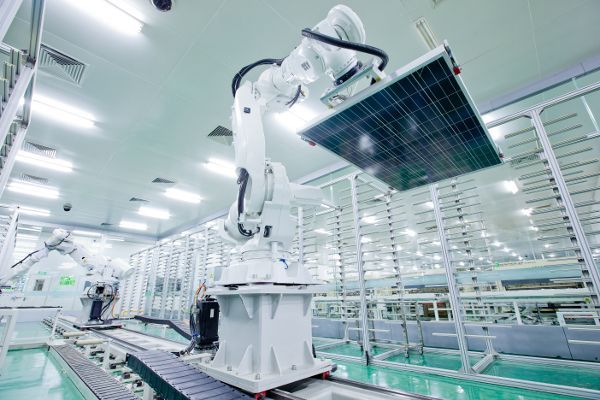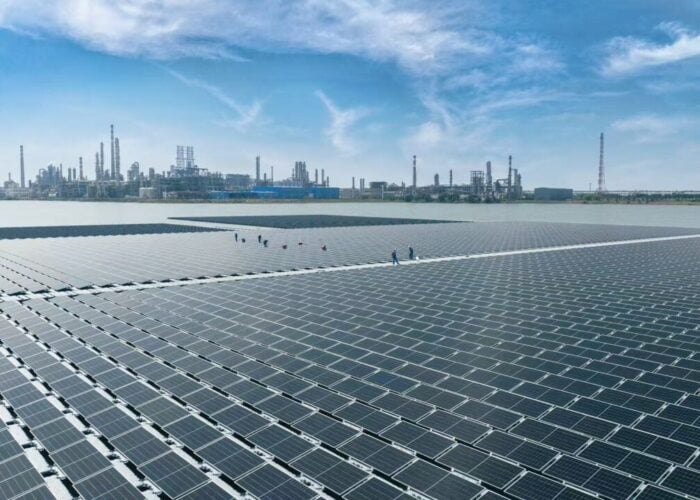
As 2022 comes to an end, PV Tech is reviewing the year in solar, reflecting on some of the biggest stories and trends of the last 12 months. Here we take a look at the major manufacturing announcements and PV equipment supply deals during Q1.
With demand for solar modules soaring as economies accelerated decarbonisation efforts amid the global energy crisis, leading PV manufacturers started the year by continuing their efforts to expand production and capture more market share.
Unlock unlimited access for 12 whole months of distinctive global analysis
Photovoltaics International is now included.
- Regular insight and analysis of the industry’s biggest developments
- In-depth interviews with the industry’s leading figures
- Unlimited digital access to the PV Tech Power journal catalogue
- Unlimited digital access to the Photovoltaics International journal catalogue
- Access to more than 1,000 technical papers
- Discounts on Solar Media’s portfolio of events, in-person and virtual
JinkoSolar revealed details of a multi-project silicon pull rod, module assembly and aluminium frame expansion in China, requiring a total investment of around RMB20.8 billion (US$3.27 billion). The company’s Jiangxi Jinko unit struck agreements to develop a 30GW silicon pull rod facility, a 24GW module assembly project and 100,000MT of aluminium frame capacity as part of the ramp-up.
On the back of higher than expected demand, JinkoSolar confirmed an acceleration to its manufacturing capacity expansion plan as it is projected to end 2022 with around 50GW of wafer, 40GW of cell and 60GW of solar module capacity.
Rival manufacturer JA Solar unveiled an RMB3.5 billion (US$552 million) investment programme for new facilities, including 2.5GW of silicon wafer production capacity in Vietnam, 1.3GW of high-efficiency cell production capacity in Ningjin, China, and 10GW of module auxiliary material production in Yiwu, China.
Further upstream, polysilicon and wafer producer GCL-Poly Energy completed the construction of a 30,000MT granular silicon facility, while another polysilicon manufacturer, Daqo New Energy, provided an RMB10 billion (US$1.6 billion) capital injection to a subsidiary, allowing it to advance on the first phase of a 100,000MT high-purity polysilicon project in China’s Inner Mongolia region.
Against this backdrop of ongoing capacity expansions across the PV supply chain, Q1 2022 saw a host of notable equipment supply deals. Daqo said was sold out for the year after signing a 30,000MT long-term supply agreement for high-purity mono-grade polysilicon.
Regarding module supply, JinkoSolar won a tender issued by the China Petroleum Engineering and Construction Corporation to supply up to 1,850MW of its TOPCon modules. Forecasting that 25% of its module shipments this year would be attributable to its n-type TOPCon module range, JinkoSolar said TOPCon cells can be manufactured quickly and inexpensively, “providing a lower-cost alternative to replace PERC as the next mainstream solution”.
In March, thin-film PV manufacturer First Solar secured a deal to supply 1.5GW of its modules to SoftBank-owned SB Energy, to be deployed in US projects. The manufacturer went on sign an even larger supply deal a month later, for 4GWdc of modules for independent power producer Silicon Ranch.
While First Solar warned in March of a challenging 2022 due to shipping delays, costs and reliability issues, the company went on to receive a host of additional module orders throughout the year as it revealed plans to expand its production in the US, reflecting a trend across the industry of PV manufacturers looking to scale up operations closer to end markets.
During Q1, Shoals Technologies revealed it would double its electrical balance of system manufacturing capacity with a new US facility, while inverter manufacturer SolarEdge increased shipments to the US from a production plant in Mexico to save on freight costs and reduce the impact of tariffs on imports.
In India, meanwhile, the country had around 18GW of module manufacturing capacity as of Q1, but JMK Research & Analytics forecasted that this figure would soar to 36GW by the end of 2023. The consultancy said India’s production-linked incentive scheme is a “major catalyst” for the country’s solar industry and is expected to incentivise about 40–50GW of module production capacity.
Additional support for domestic manufacturers was provided through India’s introduction of a 40% basic customs duty on solar modules and 25% duty on cells at the end of the quarter. One company looking to take advantage of the favourable policy environment was Vikram Solar, which revealed plans to set up a 2GW integrated cell and module manufacturing plant in India.
Alongside efforts to expand PV manufacturing, solar project construction accelerated in Europe as part of efforts to reduce Russian gas imports following Moscow’s invasion of Ukraine. The European Union (EU) said it would simplify renewables permitting as part of its REPowerEU strategy, aimed at reducing EU demand for Russian gas by two-thirds by the end of 2022. “Let’s dash into renewable energy at lightning speed,” EU climate policy chief Frans Timmermans said at the time.
With lengthy administrative procedures identified as one of the key obstacles for investments in renewables, the REPowerEU strategy promised to look at how regulatory bottlenecks could be eased to speed up renewables permitting and minimise the time for the rollout of projects and grid infrastructure improvements.
While Europe accelerated solar installs, deployment in the US would be hit by the Department of Commerce’s decision to investigate alleged circumvention of antidumping and countervailing duties by solar manufacturers in Cambodia, Malaysia, Thailand and Vietnam, a probe that send shockwaves across the industry throughout 2022.







